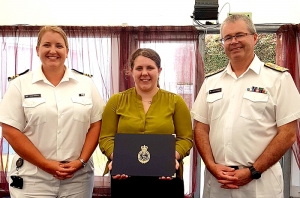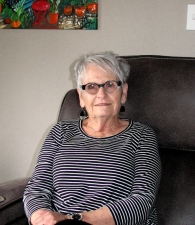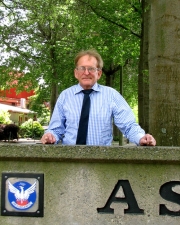Search

 Lieutenant Commander Kelly Osborn (left) with Leanne Walsh and Rear Admiral David Proctor, Chief of Navy. Photo supplied.Leanne Walsh is heading off to Canterbury University $5000 better off, thanks to the New Zealand Royal Navy awarding her the HMNZS Canterbury scholarship in December last year.
Lieutenant Commander Kelly Osborn (left) with Leanne Walsh and Rear Admiral David Proctor, Chief of Navy. Photo supplied.Leanne Walsh is heading off to Canterbury University $5000 better off, thanks to the New Zealand Royal Navy awarding her the HMNZS Canterbury scholarship in December last year.
Started in 2005 to commemorate the decommissioning of the frigate HMNZS Canterbury, the scholarship is awarded to one school leaver per year who will be attending Canterbury University, to help with their first year study costs.
In order to receive the scholarship, Walsh had to submit a 500-word personal statement to show that she not only possessed strong leadership skills, but she also embodied the four core values of the Royal New Zealand Navy – courage, commitment, comradeship and integrity.
A committed Ashburton College student, Welsh had plenty to write about in her scholarship submission.
She gained an overall excellence in NCEA Level Two, and was presented with top scholar awards in chemistry, biology and music, she was also the top overall student enrolled in the three sciences.
Alongside her academic achievements Welsh is also heavily involved with the Jion International Karate Dojo Ashburton club.
She has been studying and teaching younger club members for over half of her life.
Competition success is something Welsh is also known for having received many top three competition placings over the years.
In December last year she advanced to first senior dan black belt level.
Her leadership skills go well beyond those she shows at karate. Welsh also impressed with her willingness to take on mentoring and coaching roles within her school environment.
Taking on the roles of student welfare committee member, peer support leader and volunteer student librarian saw her interact successfully with a wide variety of the student body.
“It is nice to have all the effort I have put in to study and the karate club to be recognised, I don’t do it for the recognition, but it is nice all the same.”
A passion for sciences has made for a natural progression to engineering at Canterbury University.
On completing her degree the talented student is looking to move into the field of electrical engineering.
She she hopes to make a difference to the over one billion people globally living without electricity, via developing ways to change this without impacting adversely on the environment.
Having the financial pressure taken off her for the first year of her engineering studies, not only frees her from first year money worries, it also means Welsh is able to continue with her much loved karate.
“Karate can be an expensive sport.”
The cost of training and travelling to all the competitions adds up, so the scholarship will allow her to carry on with the sport that means so much to her.
Welsh, and mum Tracey, travelled to Auckland’s Devonport Navy Base to officially receive her scholarship certificate.
It was an experience that neither of them will ever forget.
“Knowing that the Navy believe in me was a real confidence boost,” Welsh said.
“And knowing that Mum is proud of me means a lot too.”
While they were there the pair got to have a good look around the base, meet the staff and hear about what engineering opportunities the Royal Navy has to offer.
Accompanying her scholarship certificate was a cover letter from the Royal Navy.
In it they describe Welsh as a “well rounded, incredibly humble young woman with a bright future”.
By Heather Mackenzie © The Ashburton Guardian - 7 January 2020
 Judy Jemmett is retiring after a working life dedicated to education. Photo Sue NewmanAshburton’s Judy Jemmett is retiring after a working life dedicated to education. She catches up with Guardian reporter Sue Newman.
Judy Jemmett is retiring after a working life dedicated to education. Photo Sue NewmanAshburton’s Judy Jemmett is retiring after a working life dedicated to education. She catches up with Guardian reporter Sue Newman.
When the final assembly for the year was held at Ashburton Intermediate School, it was also the final day of school life for deputy principal Judy Jemmett.
In some ways it seems a long, long road since she started her teacher training in 1966 as a 17-year-old, but in others it seems no time at all, she said.
Over all those years, however, there’s never been a moment when she hasn’t loved the opportunity to spend her working day with youngsters, when she’s lost the love of teaching.
If deciding to be a teacher was easy, deciding to retire was not.
“It’s been very hard to make the decision to retire, it took two years.
“I’d planned never to still be there in my 70s but here I am,” she said.
And at 71, Jemmett believes she’s done with classroom time, but admits there’s a chance the odd spot of relieving might tempt her back.
She trained at a time when you were paid to train, with the trade off, of a five-year bond.
Leave before your time was up and you paid back some of that money.
“I didn’t break my bond, but I think I’ve more than paid it back,” she said.
All of her teaching years have been spent in Ashburton schools, with Allenton her first appointment.
“After five years I stopped and had my children but during that time I retrained as a pre-school supervisor for playcentre because I couldn’t just do nothing,” she said..
Five years later, with three children, one of whom was a baby, Jemmett said she was doing a variety of jobs to keep busy.
Idle time didn’t sit easily and she was tempted back into teaching with a relieving position at Ashburton Intermediate.
That was 1979 and the beginning of what would stretch to a 40-year association with the school that has taken her from reliever, to part-timer to full-timer and to deputy principal.
“I guess I’ve devoted myself to education really and I love the intermediate kids, the emerging adolescents. It’s a special age,” she said.
One of her teaching highlights was setting up a special needs unit at the intermediate just prior to becoming deputy principal in 2006.
And she’s always retained a passion for working with children with challenges.
“It’s very rewarding and I love these kids in spite of them doing things wrong, all kids make mistakes.
“You just have to be firm and fair and never take sides.”
Before the arrival of current principal Brent Gray, Jemmett spent a year as acting principal, a new challenge and one she says she enjoyed.
Becoming a teacher might have been her ambition but staying on at school was not what her parents had planned.
Her parents thought office work would be the best option and they were keen for her to leave school at the end of Year 10.
Jemmett had other ideas.
“I’ve got Win Daniels (head mistress) to thank for my going back to school for another year.
“She convinced my father to allow me to go back for another year.”
At the end of that year Jemmett was only 16 but knew it was now or never if she wanted to train as a teacher.
“I had to go before a panel and they asked if I wasn’t accepted would I apply again the next year.
“I said no, I’ve already had my bonus year back at school.
“If I don’t get in I’ll be in an office.”
She was accepted and from day one of training loved everything about teaching.
Now with her full-time career wrapped up, Jemmett says she prefers to say she’s ‘refizing’ rather than retiring.
“One door closed but another will open, there are other opportunities out there. For me age is absolutely immaterial and now I’ll have time to do the things I haven’t had time for before.”
That includes enjoying working in her large garden, something she’s had to do a superficial race around at weekends in the past.
And there will be more time to read, do puzzles and she’s hoping there will be more overseas travel in the future as well.
“And if I miss teaching I’ll possibly do some relieving – dangerous words.
“I won’t know if I’ll miss it until the kids go back to school.
“Right now it just feels like what it is, the school holidays.”
Holiday break aside, Jemmett knows she’s cut ties.
Her keys have been handed in, her desk tidied and it’s time for new ventures.
“I take my hat off to all the teachers.
“This is more than a career, it’s a dedication and a commitment.
“You’re always thinking about school and all good teachers spend time reflecting on what they could do and what they could do better.”
Teachers might not receive the financial rewards they should today, but that didn’t take away from the knowledge that every teacher was doing one of life’s most important jobs, preparing youngsters for life, she said.
By Sue Newman © The Ashburton Guardian - 2 January 2020
 One year shy of a half century of teaching, Mark Gleason is signing off from Ashburton College’s payroll and heading for retirement. Photo supplied.When Mark Gleason arrived in Ashburton back in 1971 he intended to stay one year and then head back to Christchurch; 49 years later he’s signing off from his only job in the education sector, teaching students at Ashburton College.
One year shy of a half century of teaching, Mark Gleason is signing off from Ashburton College’s payroll and heading for retirement. Photo supplied.When Mark Gleason arrived in Ashburton back in 1971 he intended to stay one year and then head back to Christchurch; 49 years later he’s signing off from his only job in the education sector, teaching students at Ashburton College.
American-raised Gleason arrived in New Zealand as an 18-year-old.
His parents decided providing the tertiary education they wanted for their five children in New York was too expensive, but New Zealand offered good, affordable opportunities.
They travelled the length of the country, looking for the right place to settle, found it in Christchurch and Gleason enrolled at Canterbury University.
A masters degree and teacher training later, he graduated and began searching for his first job.
“In those days the government subsidised teacher training so there were lots of good quality candidates, you couldn’t be too selective.
“Jobs were tight in Christchurch, but I decided Ashburton was pretty close,” he said.
He won a job teaching English and history and decided what he perceived as a small country town would do for his first year in the classroom.
“But once I was here I found it had most of the things I wanted.
“I stayed because it was close enough to Christchurch and my family. It had all the Christchurch facilities and house prices were a lot cheaper.”
It was the lure of home ownership that sold wife Lesley, a speech therapist, on the move, he said.
“We did it in Ashburton within a year.
“We were making $4000 a year and we bought two sections and a house for $6000 so it was very easy for us to get traction.”
The Gleasons were in Ashburton to stay and raise their four children.
He might be something of a rarity in the teaching world, remaining at one school for all of his career, but Gleason says he has no complaints about life at the college.
“I found the facilities, even though people complain about them to be quite adequate and I’ve enjoyed the leadership of the principals I’ve had.”
As he arrived the transition from two schools and two sites was under way, with construction of the new college close to completion.
That meant a year of teaching at two and sometimes three sites.
“It was quite taxing going from site to site by car.
“At least we could see the end of it, but you began every period on the back foot as you were often late and often had to leave a class early.”
The vehicles used were off-casts of the Ministry of Education and were not required to have a warrant of fitness.
That meant most were far from reliable.
With the third generation of some families starting to arrive at college, Gleason said it was a clear signal it was time to retire.
Looking back over 49 years in the classroom, he said students today were significantly different to those he taught back in 1971.
“They’re much more sophisticated and worldly wise.
“That makes it easier and harder. You don’t have to explain so much, but with modern technology it’s a bit frustrating at times because they’re hard to supervise when you have a room full of computers.”
While technology is a useful tool, Gleason said it does have negatives – students who are constantly on their phones and don’t communicate verbally as much as they did in the past.
“And it’s very uneven now with some who have the absolutely latest and others who do not.”
As he prepares to leave the college, Gleason said he will miss conversations with his colleagues and the exchange of ideas with his Year 13 students.
“They’re very positive and knowledgeable and discussions with them could be with university students.”
College staff had always been supportive and you always felt part of a team, he said.
Highlights over the years have come through coaching college sports teams – basketball, softball and athletics.
“Some of the most rewarding relationships have been with pupils. It’s out of the classroom and some of them – boys in particular – didn’t shine in the classroom, but they did at sport.”
In the early 1980s Gleason was part of a curriculum change team that shook up the status quo and reshaped how schools were run.
New subjects were introduced and the junior curriculum became more standardised.
Staffing economies were also part of the change.
He’s reserving his judgement on the modern learning environment, saying he experienced this in the college’s early days as T block was designed for team teaching and he can see the drawbacks.
“It can be done, but it can also be just chaos. It has to be very well managed.”
And he’s not a fan of a more relaxed attitude to spelling, grammar and punctuation.
“It’s attitudinal, but these things do matter.”
Given the shortage of teachers today, Gleason believes a return to the old system of paying for teacher training and then bonding teachers for two years to a school would go a long way towards encouraging more people into the sector.
The other issue that would improve teacher numbers would be improving pay rates – they’ve never been flash, he said.
He remembers receiving his first pay cheque – the hourly rate was less than half what he earned working in the Christchurch glassworks while he was studying.
“But I’ve got no regrets, it’s been a very good and very rewarding career.”
He doesn’t plan on being a retired teacher who becomes a long-term reliever as retirement will eventually bring a move to Christchurch for the couple.
By Sue Newman © The Ashburton Guardian - 1 January 2020


